Danny Sjursen takes aim at powerful Washingtonian hawks who are trying to push the U.S. back for a third time into Afghanistan.
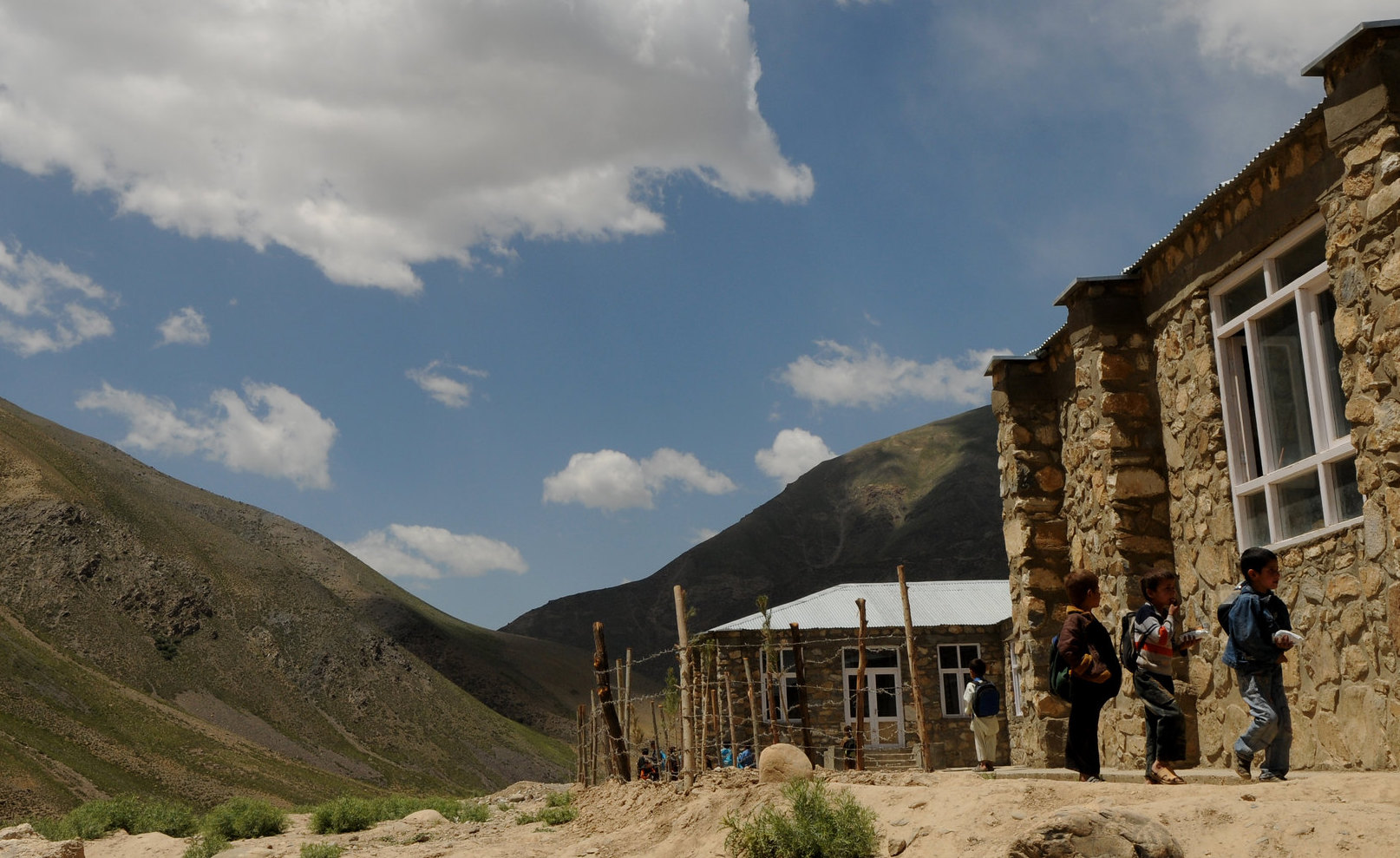
All-boy elementary school in Panjshayr province, Afghanistan, May 21, 2011. (DoD, Michael O’Connor)
 Kandahar Airfield (“KAF”) was as bizarre as it was dusty. You sort of tasted it before you smelled it — and smelled before you saw it. It’s been a full decade since I first did. When the cavalry troop I’d commanded touched down as a final top-off to President Barack Obama’s Afghan surge, we gazed upon this weird way station of America’s war effort with exhausted eyes. Fatigue breeds a certain stripped-down simplicity — “Just show me to my damn cot, already!” — so it took until morning to truly spy the strangeness. It was a place of curious contrasts.
Kandahar Airfield (“KAF”) was as bizarre as it was dusty. You sort of tasted it before you smelled it — and smelled before you saw it. It’s been a full decade since I first did. When the cavalry troop I’d commanded touched down as a final top-off to President Barack Obama’s Afghan surge, we gazed upon this weird way station of America’s war effort with exhausted eyes. Fatigue breeds a certain stripped-down simplicity — “Just show me to my damn cot, already!” — so it took until morning to truly spy the strangeness. It was a place of curious contrasts.
Dry dirt roads, but plenty of civil and military traffic – like Luke Skywalker’s home planet Tatooine, with tanks and Toyotas alike.
Inbound rockets and bomb shelters; and T.G.I. Friday’s dine-in on the base’s bustling boardwalk.
Trauma patients flown in daily to the hyperactive hospital; and amateur athletes flocking nightly to the Canadian-dominated hockey rink.
Long morning runs to condition ourselves for field duty; and long morning lines to caffeinate our souls with Tim Horton’s coffee.
A nomadic camp with several gyms.
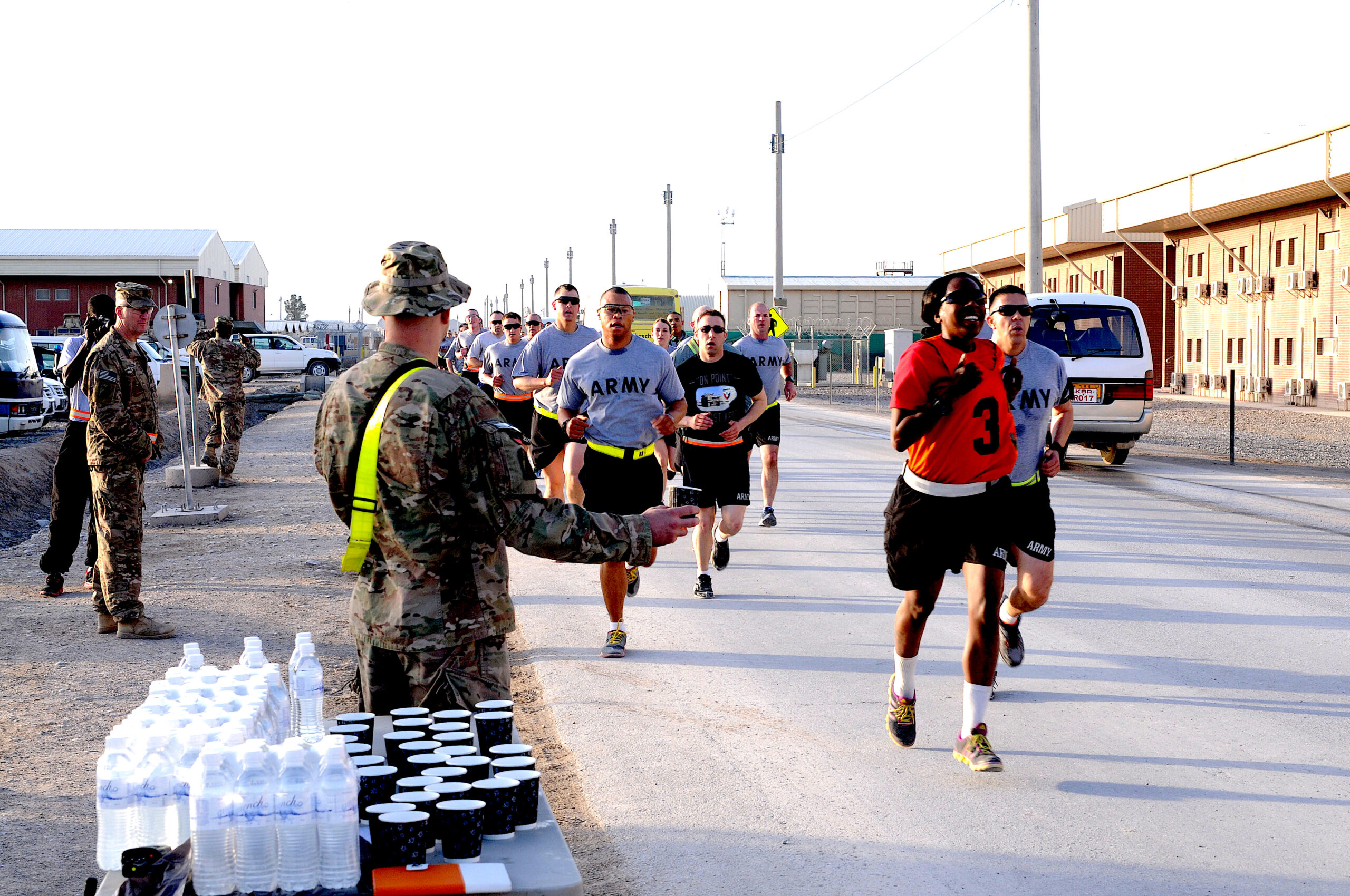
April 26, 2014: U.S. soldiers in a running challenge at Kandahar Airfield, Afghanistan. (U.S. Army, Jon Cupp)
The feel of a refugee encampment with the look of an imperial Epcot Center.
I hated the place, and myself for guiltily cherishing the reprieve of its relative safety.
As an ill-fated ground combat outfit, my squadron only camped out a couple of weeks before choppering to the rural “frontlines” for a hopeless tour of duty. As an ill-fated mega-base, KAF stuck around for another decade before closing down its role for a hopeless war of absurdity.
That the U.S. Army actually exited that gloomy garrison town — which, once housed 30,000 multinational troops and contractors, had a larger population than any place in the province besides Kandahar City proper — seems almost unimaginable to my entire generation of soldiers. The same goes for our brethren who tramped — and trampled — the northern half of Afghanistan, for whom last week’s withdrawal from the sprawling Bagram Airbase outside Kabul must’ve felt bewildering.
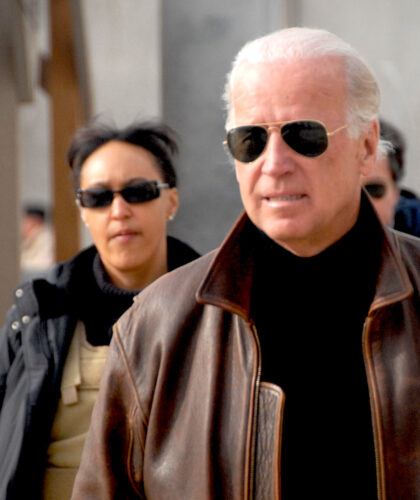
Jan. 11, 2008: U.S. Vice President-elect Joe Biden in Kandahar, Afghanistan. (U.S. Navy, Aramis X. Ramirez)
The way we’re leaving is even less comforting for those who left limbs, mates and mental health on Afghan battlefields. At Bagram, the last U.S. elements snuck out like thieves in the night, not even notifying the base’s new Afghan commander — local looters ransacking right on their heels.
Meanwhile, outside America’s final fantasy fortress, the Taliban is on the march — and at the quick-step, with major fighting now raging just 60 miles outside the capital. Washington’s frustratingly stalwart enemy now commands about one-third of the country’s 400-odd districts, and is contesting control of at least another third. And the offensive is gathering momentum — with the Taliban seizing around 100 more district centers in as many days — posing the ever-present risk that this produces an inertia of inevitability. After all, war remains as much about morale and psychology as missiles and Predator drones.
For all that, I say good riddance. Goodbye to all that — to those Pizza Hut-packed Potemkin villages, our mirage-like mission-sets, false promises, and any noxious nostalgia for a war that couldn’t have been won and shouldn’t have been fought.
America has already attempted two adventures in Afghanistan’s imperial graveyard. Neither ended well, and both backfired.
In the 1980s, Washington waged a shortsighted and indulgent proxy war against the country’s then Soviet occupiers, backing the most reactionary Islamist forces that would later form like an (era-appropriate) Taliban Voltron.
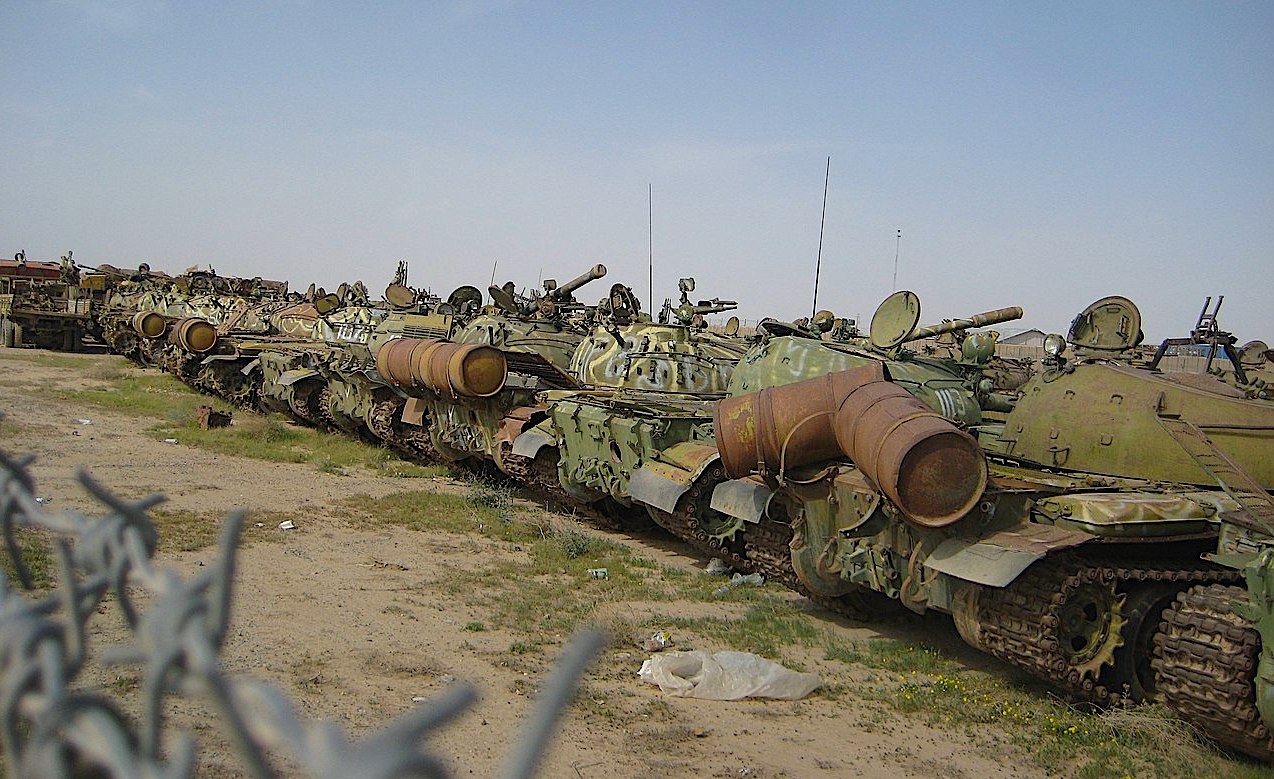
Abandoned Soviet T-54/55s lined up outside Kandahar Airfield in Afghanistan, April 2011. (Wikimedia Commons/Gregology)
Sure, the U.S. vengefully handed the Soviet Union – per President Jimmy Carter’s National Security Advisor Zbigniew Brzezinski — its own “Vietnam,” but (karma being a bitch, and all) the CIA-fueled blowback after the Russian retreat included a worldwide jihadi diaspora and a man named Bin Laden. America’s overreaction to ole Osama’s awful but one-off 9/11 attacks then almost tragicomically handed the U.S. its own Vietnam encore.
Twenty years deep into Nam-the-Sequel, here’s hoping — heck, begging — that the Biden Family’s reigning don resists the establishment crowd’s cacophonous cries for a trilogy. As in most matters, The Godfather offers a guide. There was no need for a third installment, and it wasn’t long after Don Michael Corleone famed exclamation in that final film — “Just when I thought I was out, they pull me back in!” — that he found himself shot, and his dear daughter dead in his arms.
Mindless Arguments from Mad Men
The veterans of the Afghan War are long past done with the war an apathetic American public long-since stopped caring about. Recent polls show that fully 73 percent of the conflict’s veterans supported a full withdrawal of U.S. military forces, along with 69 percent of their family members. In other words, America’s warriors are more antiwar than their (also pro-withdrawal) civilian counterparts — only 12 percent of whom, according to an AP Poll, closely follow Afghanistan-related news. How’s that for a healthy civil-mil-balanced society?
Only not everyone agrees, and it’s the most powerful, influential, and wealthy Washingtonian war-hawks who make up the most vocal minority. It is these cats — controlling the most communication mediums with the most reach — that are trying their darnedest to pull Biden back in.
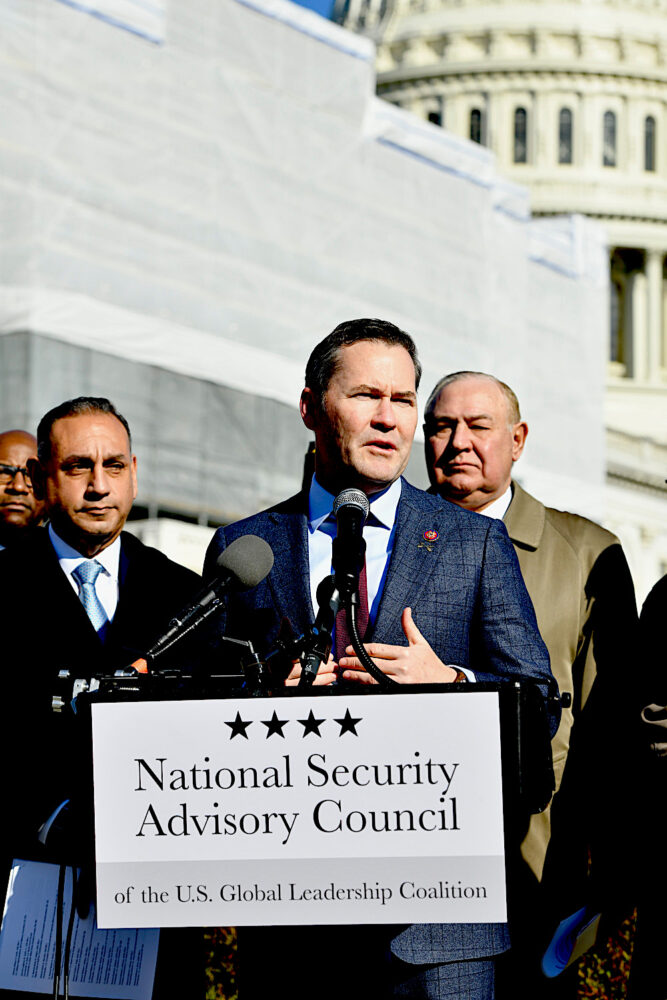
Florida’s Rep. Michael Waltz in 2019. (USGLC, Flickr, CC BY-NC-SA 2.0)
Leading the loud charge with the most worn, debunked, stay-the-course arguments are, of course, the obvious lunatics — lawmakers of the classical warmongering Republican variety. Most loathsome in this lot has to be Florida’s Congressman Michael Waltz — himself an Afghan War veteran, a Green Beret to boot.
In a fit of rhetoric befitting imperialism-classic, Rep. Waltz tweeted that, “As our only base sandwiched between China, Russia and Iran, [Afghanistan’s] a huge strategic asset” – proof that there’s apparently endless utility in blaming those countries to justify any and all endless wars. He then casually asked, “Why are we just giving it away?”
Well, maybe because Afghanistan isn’t a base, it’s a country – with real human people living there, even – and because, you know, both legally and ethically it’s not ours to give away! Waltz then trotted out the same sorry sunken-cost and emotive-as-ever arguments we’ve been hearing for decades now. America can’t leave Afghanistan, he asserted, because “It’s by far the biggest symbol of our 20 years of blood and treasure we have expended for all veterans that have served there.” Apparently, Waltz believes the only way to wash away wasted blood is with more unnecessary blood.
Watch Rep. ?@michaelgwaltz? , a former Green Beret commander in Afghanistan, talk about President Biden’s decision to withdraw from Afghanistan and label it “asinine.” https://t.co/wjpqnd6twi
— Lindsey Graham (@LindseyGrahamSC) July 3, 2021
Then there are the other usual suspects, like Bush-era Secretary of State Condoleezza Rice — who literally told the House Foreign Affairs Committee that, “We’re probably gonna have to go back.” Seeing as she has never once been right about post-9/11 foreign policy, remind me why anyone even asks her opinion anymore?
Back in April, another one who has never been right, pundit Max Boot, warned in an opinion column that, “Biden’s Afghanistan withdrawal could be the first step to a Taliban takeover.” Well, actually, it would be more like the last step. America’s failed and futile strategies — which Boot cheered at every hawkish turn —surely accounted for the first few dozen doomed steps. Boot’s employers at the “liberal” Washington Post’s editorial board published an editorial the very same day, headlined, “Biden takes the easy way out of Afghanistan. The likely result is disaster.”
Track Record of Debacle
Undercutting these tired old arguments from unhinged old men (and women) are basic realities on the ground and a 20-year track record of debacle. Some highlights of the inconvenient indicators that more U.S. intervention would prove a preposterous waste of blood, time, and treasure include:
- More air strikes won’t ultimately matter. In 2019, the U.S. dropped 7,423 bombs on Afghanistan — eight times as many as in 2015 — and still here we are, with the Taliban at the gates.
- The Kabul government lacks real legitimacy with many Afghans. Every one of the country’s four presidential elections was marred by obscene and verifiable fraud.
- The joint is a drug den. Despite spending $9 billion trying to eradicate Afghanistan’s narcotics trade — especially heroin — the country still accounts for 90 percent of the world’s illicit supply of opium-poppies. Between 2001 and 2018, the number of hectares of land devoted to the crop increased 32 times.
- Corruption runs rampant among Kabul’s illegitimate rulers, and the U.S. was always part of the problem. Washington empowered war-criminal warlords — who are again on the rise, risking a 1990s civil war redux — and funneled enough unmonitored funds to local politicians and power-brokers to enable the Kabul government to “self-organize into a kleptocracy,” according to Army colonel and multi-tour Afghan War vet Chris Kolenda,
About Time
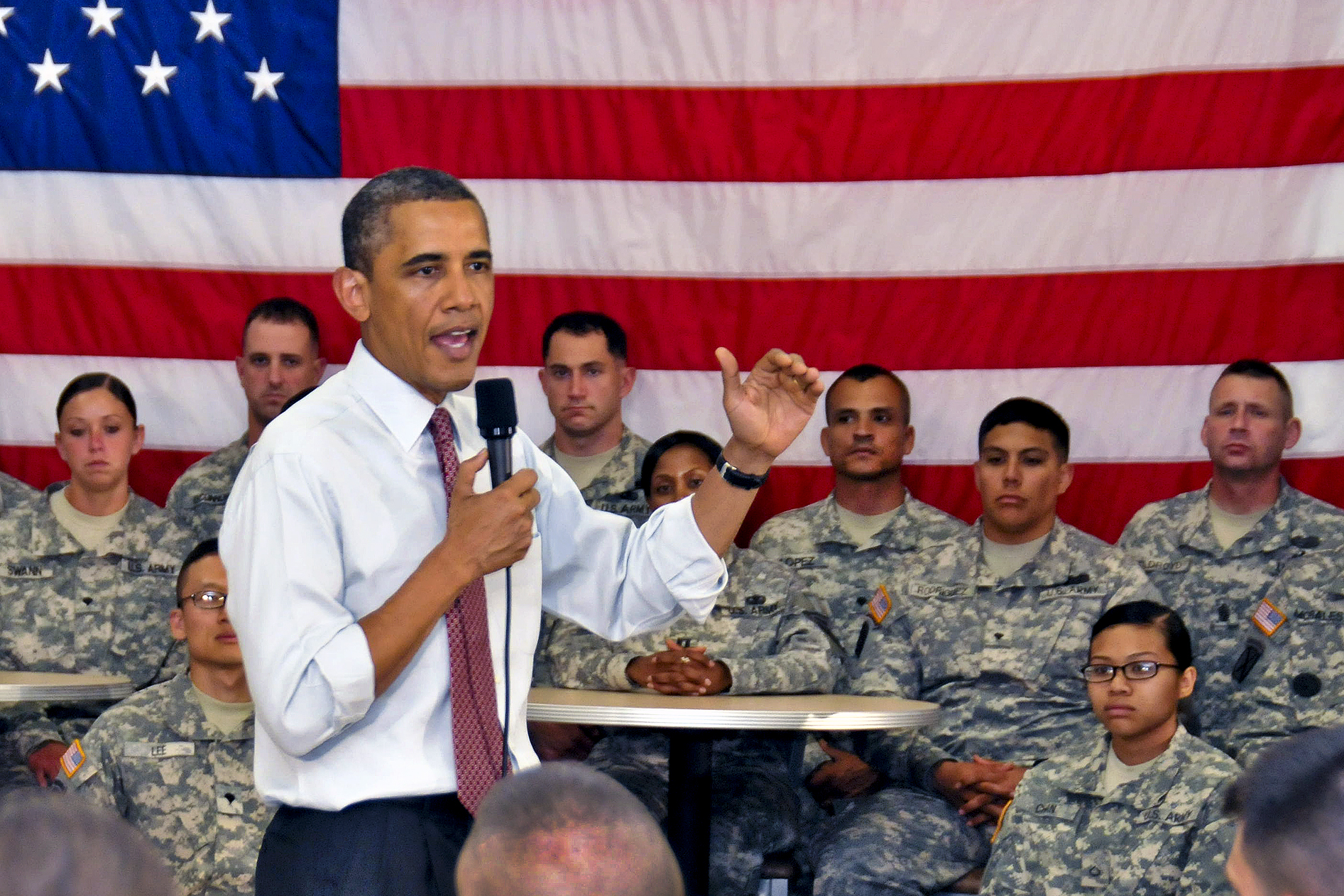
June 23, 2011: After announcing a troop drawdown on national TV, President Barack Obama speaks to soldiers who were among the first to deploy to Afghanistan. (U.S. Army/Steve Ghiringhelli)
When it comes to combating the world’s most powerful and tech-advanced army, the Taliban has adopted an oft-repeated adage — usually attributed to one of its captured fighters — “You have the watches, we have the time.”
In fact, back in June 2011, one of our interpreters overheard the local insurgents — then essentially besieging our outermost platoon strongpoint — repeat a version of that mantra over their unencrypted walkie-talkies. This Taliban middle-manager was seeking to buck-up his — probably-as-exhausted-as-mine — foot soldiers after they’d (get this!) apparently just listened to Obama’s speech that day on the “Way Forward in Afghanistan.”
In his remarks, delivered almost exactly 10 years ago, Obama said that Americans could “take comfort in knowing that the tide of war is receding” — receding because the “goal that we seek is achievable,” and “in part because of our military effort,” that “we have reason to believe that progress can be made.”
He even described some of the “progress” his two-year troop surge had already ostensibly achieved: “We’ve inflicted serious losses on the Taliban and taken a number of its strongholds;” and “Afghan security forces have grown by over 100,000 troops, and … already begun to transition responsibility for security to the Afghan people.” Plus, the U.S. military, along with its allies and local partners, had apparently been “establishing local police forces, opening markets and schools,” as well as “creating new opportunities for women and girls.”
Because of all that hard work and these hard-won gains — earned at a hefty “cost that’s been paid by the …1,500 [Americans] who have [given their lives] in Afghanistan” — Obama also announced that he would begin withdrawing U.S. troops. “By 2014,” he said, “this process of transition will be complete, and the Afghan people will be responsible for their own security.” So much for all that. Instead, American soldiers stayed seven years longer than the president promised, about a thousand more of them died there – and in the end, the Taliban turned out stronger than ever.
It seems our almost certainly illiterate, low-level, local Taliban leader was ahead of his time, which was on his side all along.
America, its army, and its tortured veterans can’t turn back time, or get it back.
And shouldn’t try.
Danny Sjursen is a retired U.S. Army officer, the director of the Eisenhower Media Network (EMN), a senior fellow at the Center for International Policy (CIP), contributing editor at Antiwar.com. He co-hosts the podcast “Fortress on a Hill.” His work has appeared in The New York Times, LA Times, The Nation, The Hill, Salon, The American Conservative and Mother Jones, among other publications. He served combat tours in Iraq and Afghanistan and taught history at West Point. He is the author of three books, Ghostriders of Baghdad: Soldiers, Civilians, and the Myth of the Surge, Patriotic Dissent: America in the Age of Endless War and most recently A True History of the United States. Follow him on Twitter @SkepticalVet.
This article is from AntiWar.com.
The views expressed are solely those of the author and may or may not reflect those of Consortium News.
Please Support Our
Summer Fund Drive!


Thank you for your service. Without you there would be no war.
There is one thing that those who make money from war and propagandizing for it, do not think of while planning all these wars and now planning for attacks on China and Russia and whomever else they desire, is the fact that many, many non-American peoples are sick and tired of all these wars. While some have just tuned out completely and don’t look in dark corners, so many of us do follow and we are worried about nuclear wars and the death of our planet one way or the other (climate change) to the point that it affects our mental health – the stress of say at least 60 years of expecting nuclear on and off, hot and cold wears a person out. Please, please America – no more wars!
Those snippets from the ever-conceited Obama, the Ivy League canned-soundbite gerbil-gibberish of ‘Exceptionalism,’ were aught but recycled Vietnam era justification parlance hauled out of U.S. history’s go-to memory hole.
That said, it is virtually impossible for the Owners of the U.S. to ever ‘lose’ a non-nuclear war in this era.
War to Them is a purely full circle, vertically integrated, profit extraction enterprise, and when seen in that light it all makes perfect sense as to its ‘whys’ within the capitalist paradigm. Hiding in plain sight, even after all of these years and decades, too few see it for what at its essence it is.
That They kept it going this long is a testament to the formulaic nature of their private Beast. The one They unleash and withdraw at Their whim and Their will. Their list of coming attractions spans the world. Their world of war theaters. The bastards.
“It’s a Big Club…. And YOU ain’t in it!” ~ George Carlin
An outstanding article! Truthful, poignant, and especially from a soldier who actually “served” there. I salute you. Mr. Sjurgen!
The Soviets didn’t invade Afghanistan, but were asked to intervene by the (at the time) the socialist/communist government in Kabul.
Zbigniew Brzezinski hated the Russians so much, as he was from Poland, that he convinced Jimmy Carter and the powers that be to help the fanatical misogynists (the Taliban) fight the Red Army in guerrilla warfare, with sophisticated weaponry. “Their Vietnam,” which was another country we invaded, as part of American Imperialism and a violation of the Nuremberg Principals.
Danny is so right about Condolezza Rice, too, and all the “experts” about the U.S. invasion of Iraq being “a cakewalk.” Another country we destroyed and brought death and destruction, misery and suffering on the Iraqi people who did us no harm.
Bad judgement? In April or May of 1967, my company was on the airstrip, ready to board the Huey helicopters for an air assault, on a search and destroy mission. We had to wait for an hour or two, as General Westmoreland paid us a visit. Standing there, we listened to his speech as he told us the war was going well, the ARVN (the Army of Vietnam) were doing well on the battlefield, and that the war should be winding down in about six months or so. Words to that effect. We looked at each other and thought, “is he for real?”
Ho Chi Minh and General Vo Nyguen Giap chased the French occupiers out and the American occupiers out of their nation and the planet didn’t tilt on it’s axis, did it?
I love the pertinent saying from one of the captured Afghan Resistance fighters: “You have the watches, we have the time.” Basically the strategy of Minh and Giap. It worked!
Great thinking and great writing. I grew up in a Marine family which was always critical of what Uncle Sam was doing, from Korea through Vietnam, all the way to the endless, borderless war on terror. I appreciate the truth you speak about the immorality and stupidity with which our leaders waste human life.
Washington can repeat every lie imaginable and misrepresent the facts with great aplomb because that is what they are exceptional at. The mindset is an autopilot which knows no other doctrine and therefore remains ignorant of either considered thought or concern for wisdom. The US is only good at one thing and that is plundering other countries by any means they can avail themselves of, without concern for International Law, lives(civilian or even their own military personnel)or repeats of the previous episodes of their never ending wars which they have always failed to win. The US is now a joke, although not a funny one, but they cannot see it, it is also listed in polls as the most likely country to start a nuclear war because of it’s aggression and blinkered self righteous view of it’s eminence on the world stage. America is bringing about it’s own downfall but will of course blame everyone else.
I DO fear for the women. Women like the 90 teenage girls murdered in May as they were leaving school. Can you imagine? Leaving is not as big a mistake as negotiating with the Taliban. Once more, women are treated like booty to be traded or sacrificed. It’s going to be awful for the women to be under the Taliban’s boot once again. We ought to give them all a ticket out of there. Then we can feel fine about leaving.
I understand the concern for women in Afghanistan, but the bombing of the school girls and women in Kabul happened when the US is still there. American troops couldn’t stop them then, and they cannot ever. The Afghans themselves are the only people who can affect what the Taliban do. Afghans do have agency – it’s if and when they choose to use it that women will be safe. So we pray to whatever gods one believes in the meantime, that all will be good.
If the military is withdrawn from Afghanistan, expect special ops troops and mercenaries, CIA and contractors to continue, in a more expensive “privatization” maneuver. (Coincidentally(?), my retired Army neighbor headed overseas last week as a contractor.)
Afghanistan was a Westernized, Soviet-style socialist state in 1979 when Zbigniew Brzezinski gave the Russians THEIR Vietnam (lasting 9 years), with the Wahhabist fundamentalists dominating the region since. Possibly Afghanistan would have failed on their own without US CIA intervention.
But it makes money for someone?
How many Special Forces, CIA, and private contractors will be left in Afghanistan?
in answer to “Why are we just giving it away?” – well, we may not be giving anything away. The democrats speak with forked tongue, and the official troop withdrawal may appease the peacenicks in the Dem party, but mercenary US troops are not withdrawn. An article in Turkey’s “Daily Sabah” today goes into some details. [Turkey is a US NATO partner: here some excerpts:
“while Turkey can claim a bigger role in the future of Afghanistan and thus strengthen its regional power position, the mission can also positively impact Ankara’s ties and cooperation with Washington and its status within the NATO bloc. Turkey, whose forces in Afghanistan have always been comprised of noncombatant troops, has offered to guard and run Kabul’s Hamid Karzai International Airport after the NATO troops’ withdrawal. Ankara has been holding talks with Washington on logistic and financial support for the mission, as questions remain on how security will be assured along major transport routes and at the airport…. without an operating airport, it is impossible to imagine any foreign organization or embassy in Kabul being able to continue operating. Since all other NATO forces are evacuating Afghanistan, there will be Turkish forces to secure and run the airport in the absence of other foreign troops,” he explained. Erdo?an added that Turkey will receive intelligence support from Washington during the mission….Erdo?an already announced that an agreement had been reached with the United States on what scope of the mission Turkey would undertake….Erdo?an said after the meeting that Turkey was looking for “diplomatic, logistic and financial assistance” from the U.S. to protect and operate the airport. Turkey also wanted Pakistan and Hungary to be involved in the mission, he said.” It seems to me that the mere withdrawal of a few thousand US troops does not signify that the US gave up control of Afghanistan, as long as NATO’s Turkey has total control over who is allowed to fly in or out of Afghanistan, following directions from Washington.
hXXps://www.dailysabah.com/politics/news-analysis/kabul-airport-mission-presents-possible-costs-benefits-for-turkey
Contractor support for the Taliban, especially by trucking companies, has been exposed by military sources, including Bradley Manning, and recently in reporting of a military families’ lawsuit.
You raise the important subject of the transport of military and construction material as the way in which this deadly, treasonous crime has occured. Why would we assume these same transport firms aren’t moving opium on the return trip?
We’ve been managing this profitable failure all these years. Why not contract it out to the Turkish government?
hXXps://www.legalreader.com/lawsuit-says-us-companies-paid-off-taliban-contractors/
Updated Lawsuit Says U.S. Companies Paid Off Taliban to Keep Contracts ActiveRYAN J. FARRICK — June 10, 2020
Oh, please…have mercy. Hasn’t Afghanistan suffered enough already? Why are the Americans so hard at understanding the obvious?
Yes Vera,you’re absolutely right.The bottom line is the people of Afganistan.
The environmental damage,
pollution,is obvious.How now the after effects of emotional,mental,spiritual
damage to human beings who were more precious than oil and needed protection.
Hopefully!!! But it’s the Obama-Clinton-Biden legacy and a Biden redux, either there or in Latin America or in Syria or in Libya or in the Ukraine or all over the place seems written in the tea leaves.
You conveniently failed to mention Bush and his eight years of criminal warmongering!
In the early 1990s, probably early ’93, a friend of mine who’d been a low ranking Soviet Army officer in the mid-1980s told me that at the time he’d seen serious Soviet intelligence estimates asserting that the US was planning to invade Afghanistan in the late 1970s. (He never served in the Soviet war in Afghanistan.)
I didn’t know how much credence to give the intelligence he’d seen back in the 1980s, but then came 2001. And then came the summer of 2002, when Afghanistan was at peace after the US had “won” the occupation but insisted on extending the war and occupation.